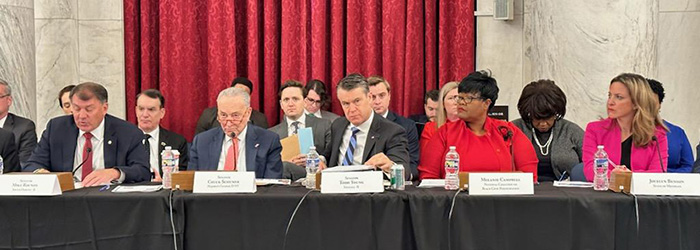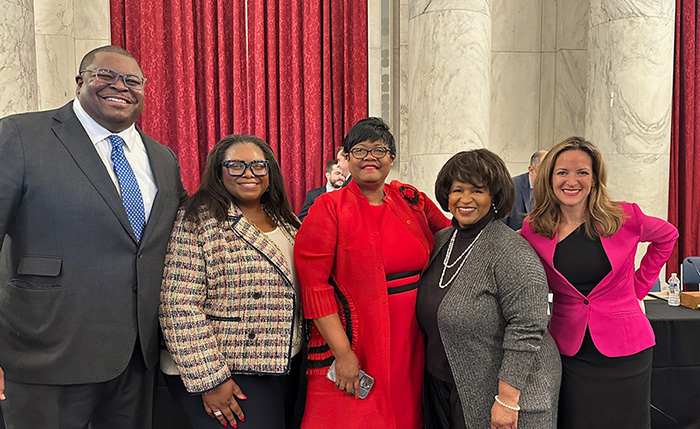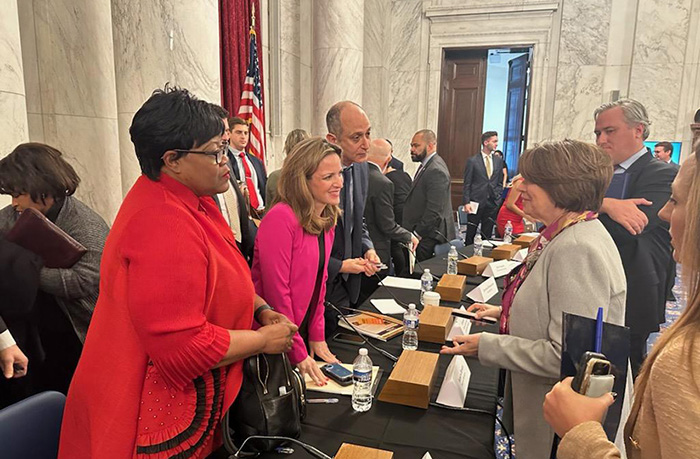Press Releases
All Media inquires, please contact:
Cecilia Cheeks at (404) 909.9540 cecilia@cecintelpr.com
Tyrice Johnson at (205) 643-4755 newmedia@ncbcp.org
Trudy B. Grant at (843) 830-7118 tgrant@nationalactionnetwork.net
Raymone Bain at (202) 386-3042 rbain28460@aol.com
Nov 8, 2023
Statement of Melanie L. Campbell President and CEO, National Coalition on Black Civic Participation National Convener, Black Women’s Roundtable on U. S. Senate - AI Insight Forum: Elections and Democracy

Senate Majority Leader Schumer, Senator Heinrich, Senator Rounds, Senator Young, and other distinguished members, thank you for holding these AI Insight Forums and inviting The National Coalition on Black Civic Participation (The National Coalition/NCBCP) the opportunity to submit a statement today on the challenges, opportunities, and impact of artificial intelligence on elections, the Black electorate, and our nation’s democracy. My name is Melanie Campbell, and I am proud to serve as The National Coalition’s President and CEO and National Convener of the Black Women’s Roundtable, the women and girls empowerment arm of NCBCP.
The National Coalition is a national civil rights and social justice organization dedicated to increasing civic engagement, voter participation and economic opportunity in Black and underserved communities; and strives to create an enlightened community by engaging people in all aspects of public life through service/volunteerism, advocacy, leadership development and voting.
For nearly 50 years, the NCBCP has been dedicated to promoting civic engagement and voter participation in the Black community. Our grassroots voter mobilization work has provided us with a keen insight into the potential harm and impact that unchecked AI systems could have on elections, and in particular, on Black voters and our democracy.

Mitigating the Proven, Potential and Perceived Harms of AI on Elections and Democracy
The work you and the Biden-Harris Administration do to harness the potential opportunities and mitigate the potential harms of AI on our elections will determine the future of our nation’s democracy. For as long as African Americans and other communities of color have held the franchise, we have been the victims of unofficial and official voter suppression and intimidation efforts aimed at stopping us from voting, nullifying our vote or gerrymandering us out of our voting power.
The examples are endless: Jim Crow Era Jelly Bean tests, to mailers and calls with incorrect voter instructions, to disinformation messages meant to fan the flames of existing demographic and societal divisions, to voter purges and challenges, to being expelled from voting commissions, to racially partisan gerrymandering, to efforts to prevent an accurate Decennial Census count, to attacks on the Voting Rights Act. Since 2020, state legislatures have stepped up their efforts to pass bills that suppress the vote. According to the Brennan Center, more than 300 restrictive bills have been introduced in 45 states. While most of these have not passed, and many voter expansion bills have passed, attacks on the right to vote color the conversation we are having today.
While technology and AI did not create voter disenfranchisement, it is the latest tool of those actors - domestic and foreign - who seek to undermine our democracy. In recent elections, AI-enabled audience targeting has been used to suppress Black voter turnout, particularly amongst black men. In our own NCBCP vs. Wohl, we filed a lawsuit against defendants alleging they sent 85,000 robocalls to Black Americans in an attempt to scare them from voting. Updating Jim Crow Era voter suppression tactics, the robocalls contained misinformation and threats that would resonate with Black voters. The calls used a phony civil rights organization and discouraged vote by mail by falsely claiming that those who voted by mail would be targeted by law enforcement, debt collectors and the Centers for Disease Control. As outrageous as this lawsuit is, it is only one example of the ways in which technology can be used to launch insidious and pervasive voter suppression campaigns. And so, African Americans have reason to approach AI within the context of elections with caution.
These same tactics can also be exploited by our foreign adversaries and underscore the national security importance of today’s discussion. The Senate Intelligence Committee reported that during the 2016 elections, the Internet Research Agency (IRA), a Kremlin-linked, information campaign operation, overwhelmingly used Facebook advertisements to target and suppress the voter turnout of Black Americans. The Senate Intelligence Committee reported that during the 2016 election, “[n]o single group of Americans was targeted by IRA information operatives more than African Americans.”
AI unregulated and homogeneously created, however, not only poses a threat to Black voters, it also poses a threat to any voter whose access to the ballot box has ever been interfered with by cynical political partisanship or who has been the target of voter misinformation or disinformation. And because perception is reality, even the specter of AI’s negative impact on our elections can have a real impact on voter confidence in electoral outcomes and on their willingness to vote altogether. A new UChicago Harris/AP-NORC Poll provides a warning and shows that voters in both parties are already fearful about the use of AI in the 2024 elections and are concerned that it will lead to the spread of misinformation.
Thus, it is past time for the White House and Congress to weigh-in with legislation and regulation that is meant to encourage innovation that helps not harms society, and especially not our most precocious and fundamental right - the right to vote.
States are Leading the Way On Creating AI Legislation
The State of Michigan’s recent legislative advancements provide a potential template for national policymakers on how to navigate the integration of AI in electoral processes while ensuring the safety and integrity of democracy. The state's House Bills 4129 to 5145 focus on preventing intimidation of election officials and regulating AI in political messaging, underscoring the importance of protecting those who facilitate our democratic processes. These laws underscore a commitment to uphold election integrity by imposing a tiered penalty system for threats against election workers, a response to the recent increase in such hostilities.
If House Bills 5141 through 5145 become law, they would specifically regulate the use of AI in political campaigns, addressing the misuse of deepfake technology and requiring disclaimers on AI-generated political advertisements to combat misinformation and enhance transparency for voters.
As these bills advance through the Michigan Legislature, they could offer a template on ways to stand against the potential for AI to disrupt political discourse through misinformation and other forms of digital manipulation by demanding transparency in AI-generated content, thereby empowering voters to identify authentic information. As federal legislators contemplate similar measures, the experiences of Michigan could inform their approach to safeguard against the twin dangers of harassment and misinformation, ensuring the safety of election officials and the truthfulness of political communication ahead of critical elections.

Recommendations for AI Legislation and Tech Industry Collaboration
The NCBCP believes it is incumbent upon the government and the tech industry to work in tandem to protect our democracy, voters, and the integrity of the electoral process against the imminent harms of bad actors who deploy AI-generated content to suppress the authentic voices of the electorate. To curtail harmful AI-generated content that is targeted at Black voters and others, it is imperative to create comprehensive legislation that is built upon a framework of equity and civil rights, and also includes provisions to address the risks associated with micro-targeted AI-generated content. These provisions should address and include the following:
- Due to the concerns regarding the potential impact of AI could have on the integrity of the 2024 Election, we recommend a task force should be established that encompasses expertise from the Election Assistance Commission, the Department of Justice, and the Department of Homeland Security. This team should be tasked with the real-time monitoring of AI's impact on the election and democracy, including any instances of voter suppression, intimidation and voter safety. The task force's mandate priority should be focused on safeguarding election integrity, limiting any systematic or identifiable efforts to suppress voter participation, and protecting voters against disinformation & misinformation by issuing guidance and recommendations deemed as necessary to secure our electoral process.
- Requiring a robust government-sponsored study on AI’s impact on elections and democracy. To provide Congress with a foundational understanding of AI’s impact on the electoral processes, it should fund government studies and research to assess how AI tools can impact and pose potential threats to election security, including election infrastructure, election offices and vendors, and election personnel. Research-based data and evidence about AI’s impact on election security would better inform Congress’ work to create legislation to protect the integrity of the election process.
- Examine pending or advancing legislation in states such as Michigan, which serve as examples where lawmakers are actively addressing the impact of AI on democracy. These legislative efforts are geared toward mitigating the potential harmful effects that AI may have on the electoral process. Notably, such states have either passed or are in the process of advancing legislation aimed at safeguarding election integrity and voter participation by curbing the spread of misinformation and other AI-related threats to democratic practices (as detailed above).
- Ensuring companies have a roadmap and incentives for addressing abuses of their technology when they occur while protecting the freedom that defines our society. Because businesses have an equally important responsibility to protect voters and our democracy, Congress should require companies that use AI-generated content on their platforms to close loopholes and change the algorithms that allow bad actors to spread disinformation and harmful content targeted to the Black community as a means for engagement. Congress should also require companies to employ robust content moderation procedures and civic integrity policies that are impactful in protecting voters and our nation’s democracy.
- Ensuring the government has the resources needed to keep up with industry, incentivizing it to consider the potential negative civil and human rights impact on the front end of innovation, beginning with the impact on those who have experienced historic discrimination and disfranchisement –especially as it relates to election security, integrity and voter participation. For example, in addition to providing greater resources to the Federal Communications Commission, the Department of Justice, and Department of Homeland Security, we also need to provide greater funding and resources to the Election Assistance Commission to strengthen its ability to assist state and local election offices to implement security measures to combat AI-enable threats to election processes.
- Requiring businesses to provide transparency about how their algorithms operate and how they use personal data, especially as it impacts elections and democracy. As it relates to the impact on elections and voting integrity, regulation should be designed to compel businesses to be transparent about their algorithmic operations in relation to elections, providing clear public notices that detail content curation and data handling, thereby bolstering democratic transparency and user awareness. Furthermore, users should be empowered with clear options to opt-out of targeted algorithms, and data practices must not discriminate, ensuring equitable digital engagement for all protected groups.
Comprehensive AI legislation that addresses both civil rights and the risks associated with the use of AI-generated content will lead to reducing the amount of voter suppression tactics targeting Black voters and others, secure our nation’s election process, and protect our democracy.
Harnessing the Opportunities and Benefits of AI on Elections and Democracy
Once we have mitigated the current harms and safeguarded against future risks of AI in elections, then we will be free to embrace the endless opportunities that AI can offer our democracy. If harnessed ethically, AI could enhance voter engagement by further and more accurately personalizing civic engagement outreach, potentially boosting civic participation among young people, Black communities, rural and urban populations. Through its capacity for deep data analysis and real-time polling analysis, AI can enable a more dynamic and responsive political dialogue and be utilized for effective outreach.
Furthermore, AI could potentially play a pivotal role in safeguarding the electoral process and extending voter assistance. If applied correctly, AI-driven security measures could more accurately detect and quickly counteract cyber threats and coordinated and widespread presence of misinformation or disinformation, fostering a more secure and trustworthy voting environment. Equally, AI-powered chatbots have the promise of democratizing access to election information, offering quick and accurate responses to voter inquiries. This could be especially beneficial in increasing the participation rates among communities that face barriers to electoral information.
According to the recent UChicago Harris/AP-NORC Poll, “[a]dults are more likely to say it is a good thing for voters to use AI chatbots to find information about how to register to vote (37%) or find information on how to cast a ballot (26%).” However, the poll showed that voters are also concerned about whether chatbots would provide reliable answers, which only underscores our point that the opportunities of AI will be hindered if people don’t trust AI. Ensuring these technologies are trustworthy, responsibly regulated, inclusive and equitably deployed is crucial to prevent them from becoming instruments of division and to instead ensure they are catalysts for an empowered, well-informed electorate.
Diversity and Stakeholder Engagement In The Development of AI Policy
As I conclude, it is important to note that at the heart of all efforts to benefit from AI in our elections, we must remember that the output is only as good as the input, personnel is policy, humans must always have the ability to intervene against unforeseen consequences, and all communities must share in the economic benefits of innovation. NCBCP alongside our civil rights partners, will continue to insist that trusted voices within communities of color are consulted throughout the technology development and deployment process to address issues early; communities of color have equitable access to best colleges and universities to ensure they have the training needed to be leaders of industry; government and industry are investing in minority serving institutes of higher learning and diverse innovators and creators; people of color are hired by the technology companies driving innovation at every level - frontline to engineering to C-Suite to Board of Directors; and finally, that our government policy makers, including Congressional staff working on AI legislation, reflect the diversity of our nation. We need all voices at the table to ensure the accuracy and effectiveness of our work and to inspire trust in our work.
To this end, we encourage Congress to build on these federal level stakeholder engagement forums with state level engagement, including field hearings that include a cross section of local government and community leaders, state and local election officials, and members of the community–particularly those who are targeted and impacted by any harms caused by AI-generated content. This engagement should be ongoing throughout the creation and implementation of laws and policies governing AI.
Conclusion
In harnessing the power of AI for the common good, particularly within our electoral systems, the responsibility of government agencies is immense. Each sector of government that interacts with elections, integrity, and voting processes must actively participate in maintaining and elevating the standards of democratic practice. This calls for a collaborative approach across all levels of governance, ensuring that AI is regulated with precision. From the local election board to federal oversight bodies, there must be a clear imperative: to work collaboratively towards a transparent and secure electoral infrastructure that maintains public trust in our systems. Thank you again for the opportunity to submitting my written statement on AI and I look forward to engaging in a dialogue with you today and throughout the development of AI legislation. NCBCP’s Black Women’s Roundtable would also welcome the opportunity to address the social, economic, and health impact of AI on women and girls in future forums and/or hearings.
(1) The Brennan Center, State Voting Laws (visited November 5, 2023).
(2) Joycelyn Tate. “Hacking Democracy: Voter Suppression has Gone Viral” Black Women in the U.S. 2020: Priorities, Policy, and Power, p. 95, (2020)
(3) Roger Vann. Why We’re Targeting the Hardest to Reach Voters. Because the Black male vote is targeted for suppression, defending democracy requires an equally targeted and data-driven response. Stanford Social Innovation Review (Sept 11, 2023).
Craig Timberg and Isaac Stanley-Becker. “Black voters are being targeted in disinformation campaigns, echoing the 2016 Russian playbook,” The Washington Post (August 26, 2020)
(4) Lawyers Committee for Civil Rights Under Law, National Coalition on Black Civic Participation vs. Wohl, (visited November 5, 2023).
(5) U.S. Senate. Select Committee on Intelligence. Russian Active Measures Campaigns and Interference in the 2016 U.S. Election Volume 2: Russia’s Use of Social Media with Additional News. 116th Congress
(6) Id.
(7) Associated Press-NORC Center for Public Affairs Research, “There Is Bipartisan Concern About the Use of AI in the 2024 Elections” (November 3, 2023).
(8) HB-4129, As Passed House, November 1, 2023. A bill to amend 1954 PA 116, entitled "Michigan election law,"
(9) Associated Press-NORC Center for Public Affairs Research, “There Is Bipartisan Concern About the Use of AI in the 2024 Elections” (November 3, 2023)









